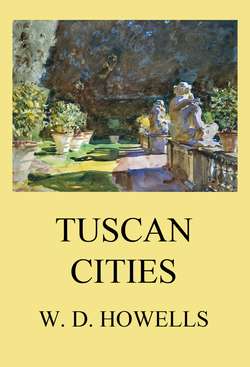Читать книгу Tuscan Cities - William Dean Howells - Страница 18
На сайте Литреса книга снята с продажи.
XV
ОглавлениеFor my part, I find it hard to be serious about the tragedy of a people who seem, as one looks back at them in their history, to have lived in such perpetual broil as the Florentines. They cease to be even pathetic; they become absurd, and tempt the observer to a certain mood of triviality, by their indefatigable antics in cutting and thrusting, chopping off heads, mutilating, burning, and banishing. But I have often thought that we must get a false impression of the past by the laws governing perspective, in which the remoter objects are inevitably pressed together in their succession, and the spaces between are ignored. In looking at a painting, these spaces are imagined; but in history, the objects, the events are what alone make their appeal, and there seems nothing else. It must always remain for the reader to revise his impressions, and rearrange them, so as to give some value to conditions as well as to occurrences. It looks very much, at first glance, as if the Florentines had no peace from the domination of the Romans to the domination of the Medici. But in all that time they had been growing in wealth, power, the arts and letters, and were constantly striving to realize in their state the ideal which is still our only political aim — " a government of the people by the people for the people." Whoever opposed himself, his interests or his pride, to that ideal, was destroyed sooner or later; and it appears that if there had been no foreign interference, the one-man power would never have been fastened on Florence. We must account, therefore, not only for seasons of repose not obvious in history, but for a measure of success in the realization of her political ideal. The feudal nobles, forced into the city from their petty sovereignties beyond its gates; the rich merchants and bankers, creators and creatures of its prosperity; the industrious and powerful guilds of artisans; the populace of unskilled laborers — authority visited each in turn; but no class could long keep it from the others, and no man from all the rest. The fluctuations were violent enough, but they only seem incessant through the necessities of perspective; and somehow, in the most turbulent period, there was peace enough for the industries to fruit and the arts to flower. Now and then a whole generation passed in which there was no upheaval, though it must be owned that these generations seem few. A life of the ordinary compass witnessed so many atrocious scenes, that Dante, who peopled his Inferno with his neighbors and fellow-citizens, had but to study their manners and customs to give life to his picture. Forty years after his exile, when the Florentines rose to drive out Walter of Brienne, the Duke of Athens, whom they had made their ruler, and who had tried to make himself their master by a series of cruel oppressions, they stormed the. Palazzo Vecchio, where he had taken refuge, and demanded certain of his bloody minions; and when his soldiers thrust one of these out among them, they cut him into small pieces, and some tore the quivering fragments with their teeth.
